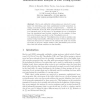Free Online Productivity Tools
i2Speak
i2Symbol
i2OCR
iTex2Img
iWeb2Print
iWeb2Shot
i2Type
iPdf2Split
iPdf2Merge
i2Bopomofo
i2Arabic
i2Style
i2Image
i2PDF
iLatex2Rtf
Sci2ools
VOTEID
2007
Springer
2007
Springer
Simulation-Based Analysis of E2E Voting Systems
Abstract. End-to-end auditable voting systems are expected to guarantee very interesting, and often sophisticated security properties, including correctness, privacy, fairness, receipt-freeness, . . . However, for many well-known protocols, these properties have never been analyzed in a systematic way. In this paper, we investigate the use of techniques from the simulation-based security tradition for the analysis of these protocols, through a case-study on the ThreeBallot protocol. Our analysis shows that the ThreeBallot protocol fails to emulate some natural voting functionality, reflecting the lack of election fairness guarantee from this protocol. Guided by the reasons that make our security proof fail, we propose a simple variant of the ThreeBallot protocol and show that this variant emulates our functionality.
End-to-end Auditable Voting Systems | Internet Technology | Sophisticated Security Properties | ThreeBallot Protocol | VOTEID 2007 |
| Added | 09 Jun 2010 |
| Updated | 09 Jun 2010 |
| Type | Conference |
| Year | 2007 |
| Where | VOTEID |
| Authors | Olivier de Marneffe, Olivier Pereira, Jean-Jacques Quisquater |
Comments (0)

